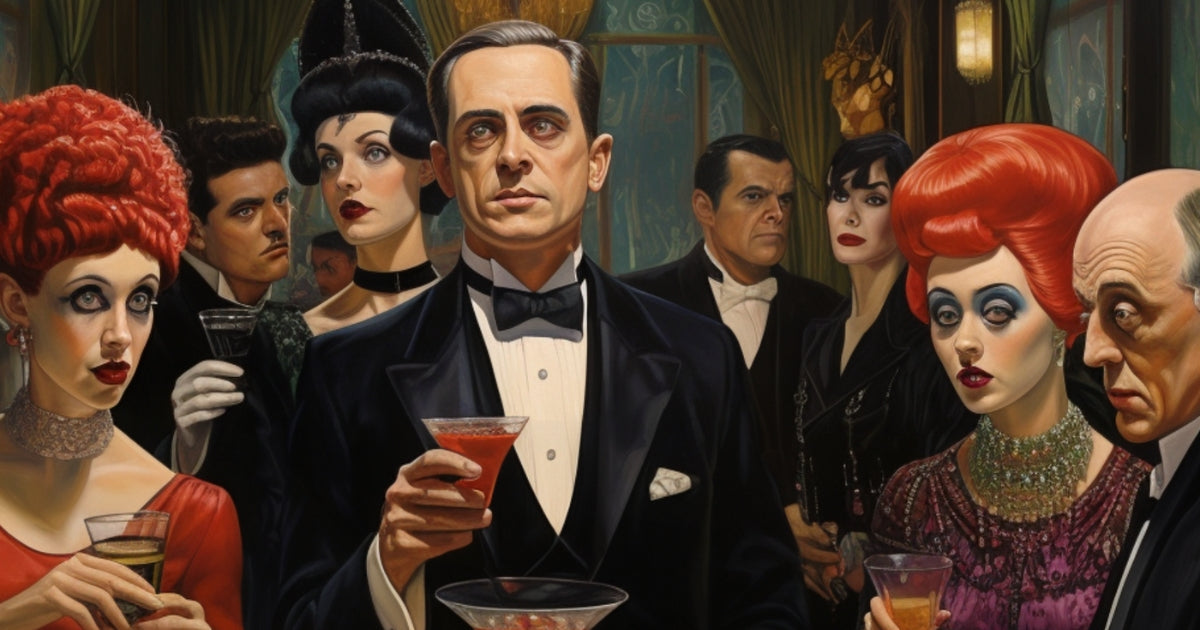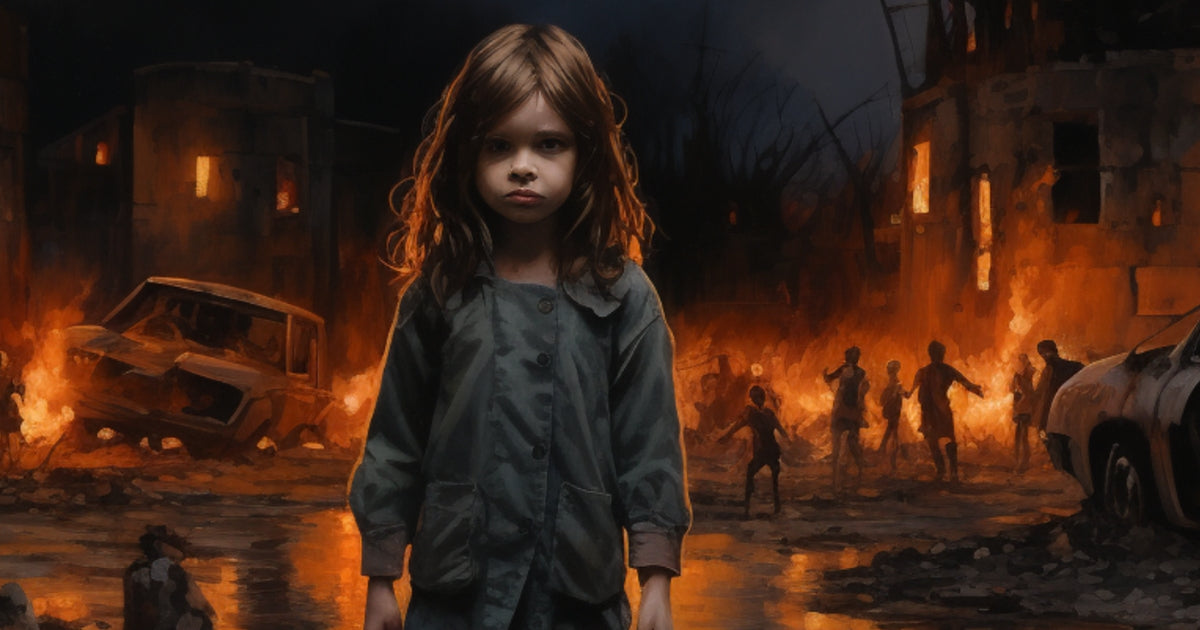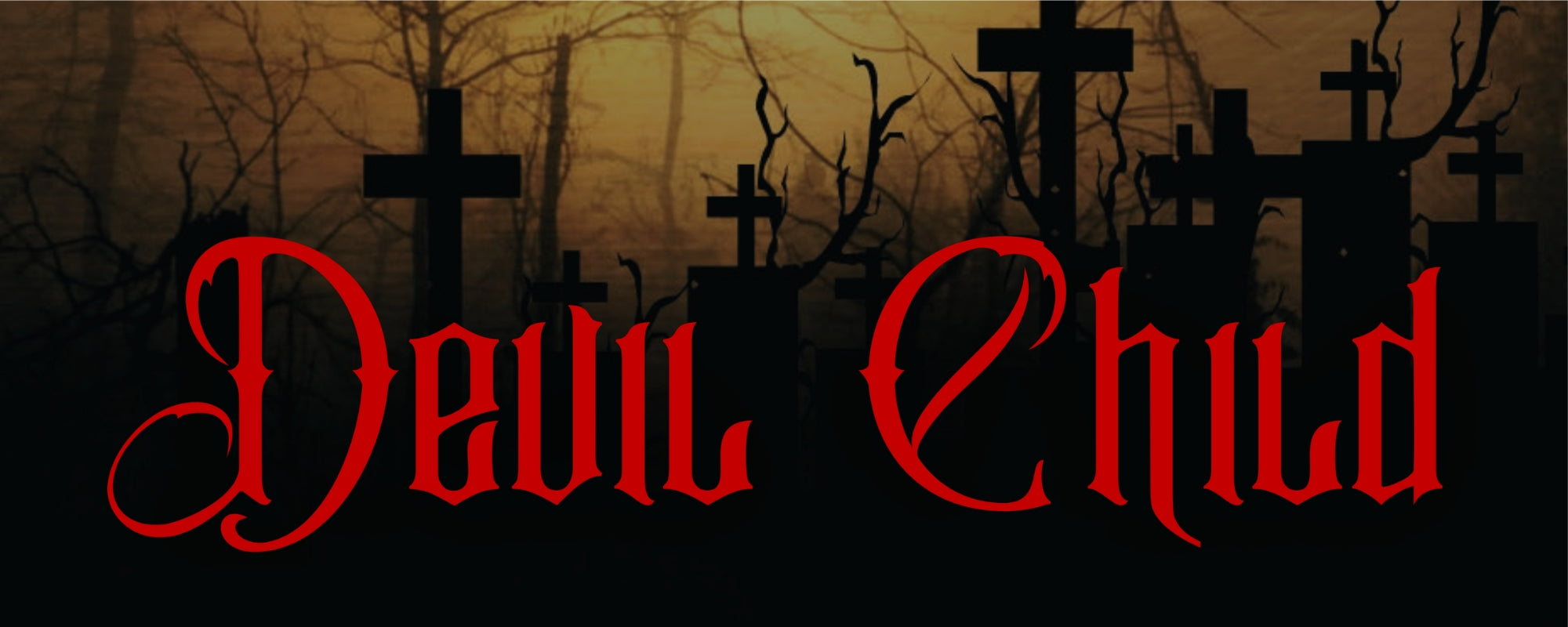
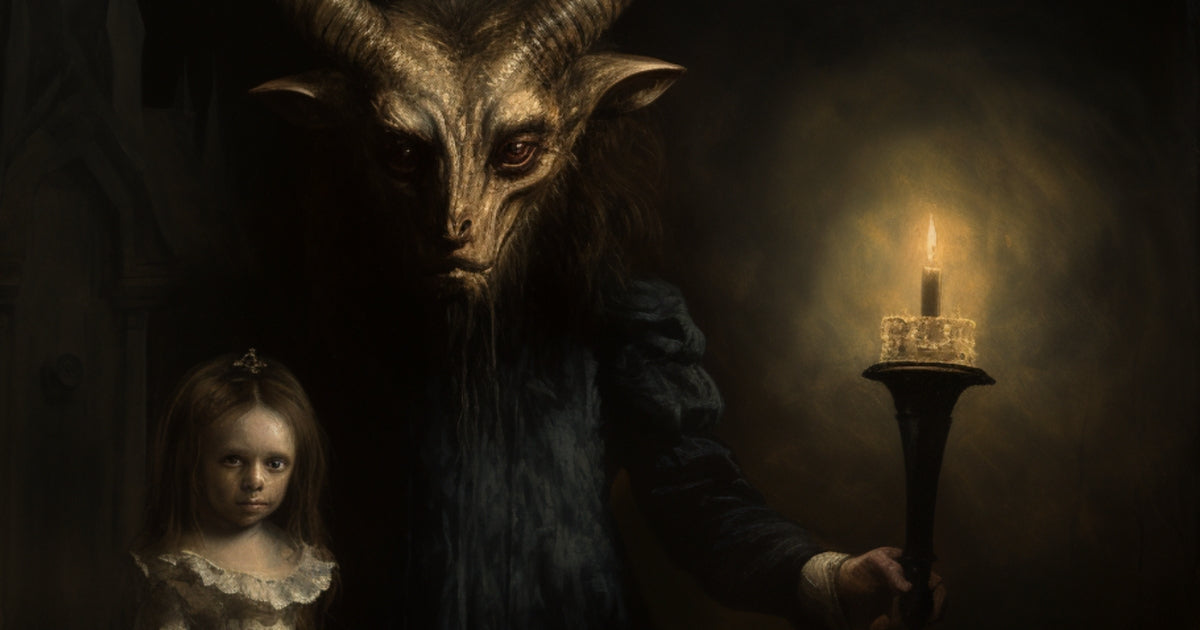
Devil Child
By Kay Hanifen
"You were born under a bad sign,” Mother once said. “I should have known then, when the pain started, that you’d be nothing but misery.” She would comb my hair, braid it into dual pigtails, her hands rough and tugging so hard it hurt. I’m not sure why she bothered. Why she played at making house. We both knew she abhorred me.
Abomination.
Devil child.
Monster.
And yet she braided my hair, tried to hide the budding horns on my forehead as though, with just the right bit of magic, she could also conceal my cloven hooves, leathery wings, and leonine face. As though I was her daughter and not a punishment for her sins.
She told me the story countless times. Her sacrifice. Mother the martyr who laid with the devil so that the rest of the family would survive the winter. A bargain struck. Their lives for the temporary use of her womb. But her husband was horrified and left by spring, their children in tow. Leaving us alone. Hoping we’d starve or freeze or die in a thousand other ways when abandoned in the woods. She loved to tell me the story of how she gave birth alone in this very shack. How she thought she would die. How the shock nearly killed her when she finally saw the creature that had been inhabiting her womb as it blindly tried to crawl up to her and suckle her breasts. She should have died, and I never should have existed. Through the infernal machinations of my father, though, we survived.
When my horns grew too big to hide behind my thinning hair, she gave up trying to conceal them with braids. Instead, she tried to saw them off. I woke one morning with my hands, feet, and even wings tied to my bed. She straddled me, a saw in one hand, and pressed my head down with the other. And then she cut into them.
The agony was like cutting off a limb. I screamed, bucking, and kicking as she struggled to saw the bones from my forehead. “Shut up!” she shouted, punching me in the face. My head snapped back in shock, and she took
advantage of my stunned state to finish with the first horn.
I was silent for the second. It hurt just as much as the first, but I didn’t dare raise her ire again for fear that she would finally decide she’d had enough of me and saw off my head while she’s at it. Once she was done, she retrieved a looking glass and held it in front of my face with a smile. “There. Isn’t that better?”
Blood and bone marrow trickled down my face, and everything was a mess of snot and tears. I looked worse than if she had just let me keep the horns, but still I said, “Yes, Mother.”
She pressed a rare, tender kiss to my forehead, and I did my best not to sob at the burning pain her lips caused. “My good little girl.”
The horns grew back a week later, but Mother didn’t bother trying a second time to remove them.
Mother is dead. She’s been dead for a time now, her purpose apparently served. My father’s magic no longer sustained her. I buried her in the backyard underneath her favorite tree. She may not have liked me, but she was still my mother. I continued to lay flowers at her grave whenever I went foraging.
A week after she fell asleep and never woke up, I dared to venture to the village, hoping that I might find some discarded food. At the bakery, I discovered some moldy bread and devoured it. Mother often went to the village to buy bread, but she rarely shared.
A woman saw me and screamed, frightening me so much that I screamed back and fled into the woods.
Abomination.
Devil child.
Monster.
I didn’t dare go back. No matter how much my stomach grumbled, I sated my hunger on whatever I could forage or catch. But then, one day, I heard crying. A child of about ten sobbed in a clearing, and I had no idea what to say or do. I would almost certainly frighten her. Sticking to the shadows, I said, “Little one, why do you cry?”
The child picked up her head in alarm. “Who’s there?”
“I won’t hurt you,” I said. “I want to help…if I can.” I had never helped anyone before. Mother always said I was too infernal to do any good, even when I foraged and fed her soup when she was ill and built fires to keep her warm. But it didn’t actually save her, I suppose. All my attempts at being good ended in failure.
The child scrunched her nose. “That’s exactly what a monster who wants to hurt me would say.”
I couldn’t help but chuckle at that. When was the last time I laughed? I couldn’t remember. “Fair point. But you don’t seem to be in a position to turn me down.”
She sighed and pulled her knees in towards her chest. “If you’re gonna eat me, just eat me. It’s better than waiting to die.”
“You’re not just lost?” I asked.
She shook her head. “I’m blind. Mostly, anyway. Can barely see two feet in front of me. The other kids decided to feed me to the monster that Goody Agnes saw. I’m of no use to the village, and so they dragged me out here as a sacrifice.” She sniffled. “Mama and Papa will miss me, though. I think. Or maybe I won’t be a burden to them any longer.”
I descended from the tree and approached carefully. This was the closest I’d been to a human other than Mother in a very long time. “I have very little. A shack. A hearth. Some food preserves. If you don’t mind my company, you are welcome to say with me.”
“You won’t eat me?” she asked.
“Of course not. You’re too scrawny for that,” I teased, and then regretted it when I saw her flinch. “Sorry. That was a joke.”
“Oh,” she said shakily.
“Can I take your hand?” I asked.
She nodded, and I helped her to her feet before leading her back to my lonely little shack. I had the supplies for a squirrel stew, so I quickly added it to the pot along with some herbs I’d gathered and placed it over the fire. “It shouldn’t be long,” I said.
She sat on the ground and curled in on herself. Though I wouldn’t dare use one for myself, I took one of Mother’s old blankets and wrapped it around the girl’s shoulders. She pulled it tighter. “You’re not just fattening me up?”
I snorted and stirred the simmering pot. “Believe me, if I wanted to fatten you up, I wouldn’t be feeding you this. What can I call you?”
“I shouldn’t give you my name,” she said. “You might be one of the fair folk.”
Huh. Perhaps that is my true parentage. I wouldn’t be surprised if Mother conflated the two. “That’s why I asked what I can call you, not your name,” I retorted. “My mother named me Lamashtu, if that makes you feel better. But you can call me Lam, if you like.” I’d always wanted to have someone call me by a nickname. Mother was never one for terms of endearment.
“After the demon? That doesn’t inspire confidence.” There was no heat to her words. Instead, she sounded almost amused. “I suppose you can call me Lucy.”
“After the patron saint of the blind,” I replied, adding a few more herbs to the pot.
“How did you know?”
“My mother made a point of teaching me about all the wonderful things I will not be a part of because of my heritage. That includes saints and a relationship with God.” The stew looked about ready, so I poured her a bowl, gave her mother’s old spoon, and guided her hand to where I had set the stew in front of her. Then, I poured myself one.
She wrinkled her nose. “Your mother sounds like a nightmare.” Taking a spoonful of the stew, she hummed appreciatively. “I think you were lying about not fattening me up, because this is delicious.”
My face heated at the compliment, and I almost wanted to cry. Mother always said my food was barely fit for the pigs. “Thank you.”
“For a big, terrifying monster, you aren’t so bad.”
I took a spoonful of my own soup. “You just can’t see me. If you did, you’d run away screaming like Goody Agnes.”
She set down her spoon. “My mother likes to say that my blindness opens me to truths that others refuse to see. I can’t see your monstrous exterior, but I do see your heart. I see the way you took me in, shared your food, and treated me kindly even though I’m a total stranger. That is not the heart of a monster.”
This time, I did cry. Silently. Always silently. Afraid that Mother would hear and give me something to really cry about.
“Lamashtu?” Lucy’s tone was anxious. Though she was a child, she carried herself like someone beyond her years. This soft, nervous voice reminded me just how young she was. “Lam? Did I say something to upset you?”
“No,” I croaked. “You’ve said nothing wrong.”
She reached out, feeling for my hand. I took it, and she gave a gentle squeeze. “And you’re not a monster.”
We both heard it at the same time. People calling in the woods. Calling for her. They wanted her back, and a part of me—the selfish, monstrous part of me—wanted to keep her. Instead, I said in the closest thing I had to a calm, level voice, “You should go. They’re looking for you.”
She surged forwards, wrapping her arms around my neck in a tight hug. “Thank you,” she said.
I hugged her back, far too aware of my strength and her fragile body. All it would take is one tight squeeze and I would break her back. She was far too delicate. Too easily broken for me to love. Getting to my feet, I carried her to the door and set her down in front. “Can you find your way to your people?” I asked.
She nodded. “And I will come back once I know the way. I promise.”
I wanted to tell her not to make promises she wouldn’t keep. It was better to leave me alone than leave me with hope that I would see her again. That I would know genuine affection. Instead, I just said, “You are welcome whenever you want.”
She wrapped her arms around my waist before dashing off into the woods, yelling, “I’m here!” at the top of her lungs.
“Lucy!” a woman cried as I shut the door. “I was so worried.”
The days after I met the child were much emptier. I had gotten a taste of kindness, and now it was like a drug. I hungered for it more than food or drink, but I didn’t dare find her again. She was where she belonged, so I just carried the warmth of that night close to my heart like the last stubborn ember glowing in a hearth.
A week later, I heard a knock at my door and smelled fresh bread. Opening it, I found Lucy standing on the other side with a basket of rolls and fruit and vegetable preserves. “I’m sorry it took me so long to get away,” she said, “but I brought you this.” She held the basket out in front of her as an offering.
Grateful, I received the gift and let her inside, listening as she chattered about the beatings the village boys got for trying to sacrifice her to a monster. Apparently, they couldn’t sit down the next day. Her parents, who had always been protective of their only daughter, had been hovering like mad for the past several days, as though she might get lost in the woods again the moment that they turned their backs. She sounded vaguely annoyed, but a part of me ached. Was this what parents were supposed to do? If I had disappeared in the woods, Mother would have said, “Good riddance.”
I handed her a crust of bread and a bowl of soup before pouring my own. “It’s vegetable soup today.” I dipped her gift in the soup and savored the taste. “This bread is delicious.”
“I made it,” she said, ducking her head. “I’m not much good at weaving or embroidery, but bread is easy. I help where I can.”
“I’m sure it’s much appreciated,” I replied, tearing off another piece.
“Suppose I’m not good for much else,” she muttered, taking another spoonful of soup and slurping it into her mouth.
“Nonsense,” I replied. “You’re good company, for one. You successfully tamed the Beast of the Wildwood.”
She snorted. “I’ve handled kittens fiercer than you.”
“Lucy, the great beast tamer,” I replied and marveled at the ease of our conversation. Was this what it was like to have a friend? I hoped so. With all my heart, I hoped she would be my friend.
And for once in my life, my wish was granted. Lucy would visit every few days, always bringing fresh bread and gossip from the village. I eagerly welcomed her, like a man dying of thirst in a desert oasis. Once, she arrived with a little black bundle along with her treats. It was a kitten so small that I could hold him in the palm of one claw.
“Mama was gonna get rid of him. Says black cats are bad luck, so I stole him away with my treat basket,” Lucy explained, cradling the creature to her chest, with tears budding in her eyes. “Will you take him?”
I held my hand out to her, delicately taking the little mass of black fur and bringing him to meet my eyes. His green eyes slowly closed, and a strange rumbling came from his body. I quickly handed him back to her. “I think I broke him,” I said.
She giggled and stroked the top of his head. “He’s purring. That means he’s happy. He knows a good owner when he sees one.”
I stroked him gently, painfully aware of my massive hands and his small, breakable body. He headbutted me, purring even louder. “Thank you,” I whispered, holding him close as he climbed his way up my shoulders and curled between a wing and the crook of my neck. I winced at the little claws digging in like thorns. “I shall call you Bramble.”
Seeming to approve, he headbutted me and licked my cheek. Lucy had a wide grin on her face as she reached up on her tiptoes and felt for him, stroking his soft fur.
And for a time, I was happy. Bramble kept me company while Lucy was away, and he proved himself to be an accomplished mouser. I had made a peaceful life for myself, alone in the woods. I never imagined a life after Mother, never thought I could feel so content.
Until Lucy burst in late one evening. She had visited that morning, so I expected that she wouldn’t be around again for the next few days. I had been playing with Bramble, waving a stick around for him to chase, and we both leapt almost a foot in the air when the door slammed open. “They know about you,” she said breathlessly. “I was followed. I’m so sorry Lam, I didn’t know. I swear I didn’t know—”
“Hey, slow down,” I said, guiding her to Mother’s old chair. “What happened?”
She sniffled, wiping some snot that dribbled out her nose. “Some boys followed me into the woods. W-when they saw you, they told the adults in the village, and now they’re calling me a witch, and they’re coming to kill you, and maybe me too. I’m sorry. I’m so sorry. Please forgive me.”
I wiped the tears from her face. “It’s okay. It’s not your fault.”
“There it is,” someone shouted from the outside.
She clutched me, her little body shivering in terror as she mumbled her apologies into my shoulder.
“Demon! I know you’re in there!” a man shouted. “Free the girl you’ve bewitched, or we will show no mercy!”
An idea struck me then. A painful one, but necessary. Some weeks ago, I had made a straw basket so that I could carry Bramble while I flew. I got to my feet and shoved a few meager necessities into it before setting a protesting Bramble inside and shutting it. Even with the extra weight, the basket still fit well enough between my wings.
“What are you doing?” Lucy asked quietly.
I knelt in front of her and wiped away her tears. My heart felt as though it would shatter, but I knew this was the right thing to do for all of us. When Mother fell asleep and never woke, I felt no sense of grief, only guilt for being so okay with her death. With Lucy, though, it felt like I was ripping out a piece of my own heart “I need you to trust me and do exactly as I say. If they want a monster, I’ll give them a monster. And after tonight, that’s all I am to you—a monster.”
“Come out before we burn you out!” another villager shouted from the outside.
“You’re not, though. You’re good.”
I pulled her into another hug. “Thank you for seeing the good in me. Now, though, you have to pretend.” I scooped her up. “Play dead and go limp in my arms. I promise everything will be okay.”
A window shattered, and the dry kindling inside my shack erupted into flame. Bramble yowled in terror. With a roar, I kicked the door open, Lucy limp in my arms. “Curses! I thought my plan of pretending to be a kindly old woman to trick the blind girl would work, but you mortals are too strong for—”
“Open fire!” one of the men shouted.
And then a chorus of “Kill the demon!” and “Kill the witch!” followed, drowning out Lucy’s parents’ cries of protest. They shot wildly, their bullets striking the burning shack behind me. Lucy gasped, then went limp. With a cry, I flew upwards, desperate to keep my precious cargo safe. Bullets ripped holes in my wings, the iron burning like the flames that once filled my hearth. I landed near the entrance of a nearby cave and staggered to a halt. Bramble cried out as I hastily set Lucy’s body down. Crimson bloomed from a bullet hole in her side.
Lucy stared up sightlessly, choking on the blood that trickled from her lips.
“Lucy,” I said, stroking her cheek. “Lucy, can you hear me?”
“Lam?” came the response, barely weaker than a whisper. “Lam, something’s wrong. I’m scared.”
“You’re all right. You’re going to be all right.” I clutched her close, which caused her to weakly cry out. “Lucy, please don’t die. Please. You’re my only friend.”
No matter how I begged, pleaded, or in my desperation, called out for the intervention of my demonic father, she still took in a shuttering breath and breathed out her last. And my grief became a rage unlike anything I’d ever known. The rage burrowed into my heart like maggots into a corpse. For once in my life, I had been happy. I thought, perhaps, that I was more than an abomination. More than a devil child. More than a monster. I was something worthy of love. And they ripped it all away from me. They killed her like she was nothing. Like she didn’t matter. The innocent blind girl who was so kind that she showed a monster what it meant to love.
Bramble headbutted me, demanding attention. Heart soothing a little, I scooped him up and placed a kiss on the top of his head. “Stay with her, love. I’ll be back.”
Despite my wounds, despite the tears nearly blinding me, despite the weight of my grief threatening to crush me, I flew. The villagers, guided by torchlight, searched the woods for us. Looking to finish the job. I landed quietly behind one of the village men. He barely had time to speak before I tore his head from his shoulders, unleashing a fountain of blood.
I spotted another and flew into him, straddling his body and ripping out his still-beating heart.
“There it is!” a woman shouted, and the sound of gunshots filled the forest. But this only inspired more rage. With a guttural howl, I charged the woman and snatched her rifle. I broke it in two and stabbed her with the pointed shards before retreating to the treetops.
“We’ll have its head on a pike!”
“They’ll tell stories of us! We’ll be saints!”
“I know these woods! It can’t have gone far!”
They thought they knew the woods, but I was a creature born of the woods, raised there. I was as much a part of the forest as it was a part of me, and I was ready to show these vile creatures what a true monster looks like.
I picked them off one by one, ripping them apart with my teeth and claws, gutting them until my hair was sticky and matted with blood. Only two villagers remained. They knelt before my burning shack and sobbed. One of them was a woman that could have been Lucy in twenty years—her mother.
They didn’t notice me when I flew off, and barely noticed when I returned, Bramble secured in his basket and Lucy in my arms. I laid their daughter in front of them, and her mother sobbed, holding her close.
Her father drew his pistol. “Get away from us, you monster.”
“I would never have harmed your daughter,” I said. “She was a kind soul and a good friend. My only friend. I hope she finds peace.”
His finger hovered over the trigger. “Liar.”
Removing Bramble’s basket, I closed my eyes, preparing for the crack of thunder and burning pain. I’m sorry, Bramble. Hopefully, you’ll be okay without me.
“Wait.” Lucy’s mother got to her feet, her daughter’s blood staining her dress. She placed her hand on top of her husband’s pistol and lowered it. “Leave it. There’s been enough death tonight.”
Not taking his eyes off me, he holstered his pistol and scooped up Lucy’s body. Without another word, the small family walked away, leaving me and Bramble alone in the ashes of the only home I’ve ever known.
I picked up his basket and carried him deeper into the woods and farther away from a world that hates us.
Copyright © 2023 Kay Hanifen
The Author
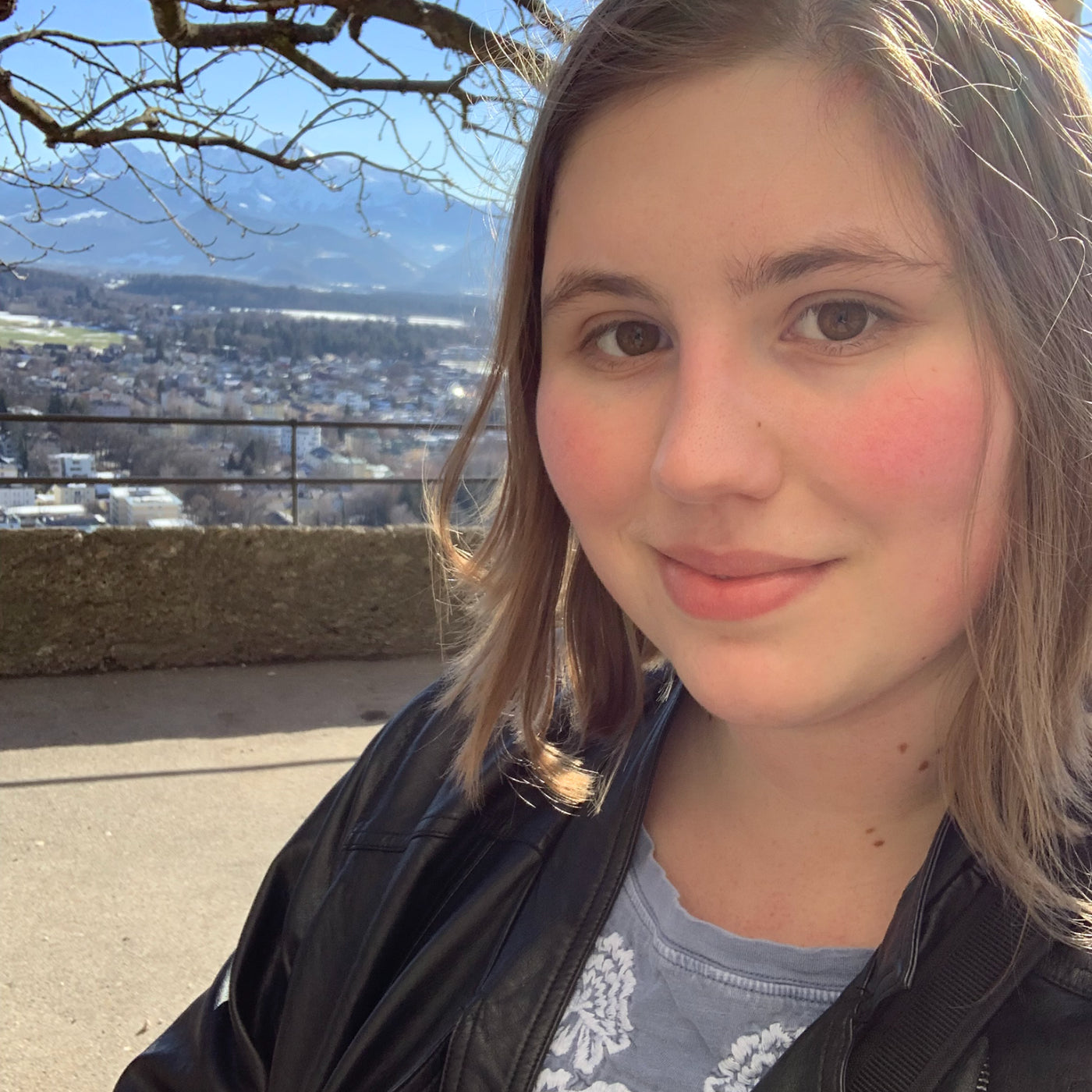
Kay Hanifen
Continue reading

Get Issue Updates
Promotions, new products and sales. Directly to your inbox.


